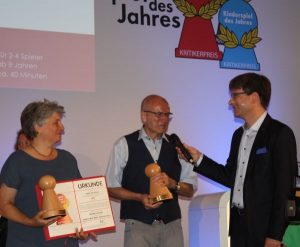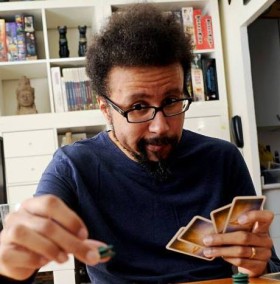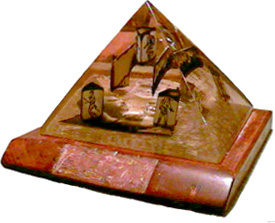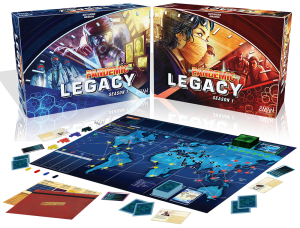2018 Spiel des Jahres Awarded to Azul, Kennerspiel des Jahres to Die Quacksalber von Quedlinburg
23 Jul
Posted by David Miller as Modern Board Games
 The 2018 Spiel des Jahres—German Game of the Year—has been awarded to Azul from publisher Plan B Games and designer Michael Kiesling. Azul is a game about decorating with the Moorish patterned tiles popular in Portugal.
The 2018 Spiel des Jahres—German Game of the Year—has been awarded to Azul from publisher Plan B Games and designer Michael Kiesling. Azul is a game about decorating with the Moorish patterned tiles popular in Portugal.
The Kennerspiel des Jahres, or Expert Game of the Year award, was given to Die Quacksalber von Quedlinburg from publisher Schmidt Spiele and designer Wolfgang Warsch. In Die Quacksalber von Quedlinburg, players assemble quack-remedy potions by drawing ingredient tokens from individual bags. An English version of the game should be available from North Star Games in November.
 This year the jury also awarded a Sonderpreis des Jahres, special prize, to Pandemic Legacy Season 2 for implementation of the Legacy system to integrate story with game mechanisms while evolving the game as it’s played.
This year the jury also awarded a Sonderpreis des Jahres, special prize, to Pandemic Legacy Season 2 for implementation of the Legacy system to integrate story with game mechanisms while evolving the game as it’s played.
- Comments Off on 2018 Spiel des Jahres Awarded to Azul, Kennerspiel des Jahres to Die Quacksalber von Quedlinburg
 Industry professionals consider the Diana Jones Award to be the unofficial kickoff of Gen Con.
Industry professionals consider the Diana Jones Award to be the unofficial kickoff of Gen Con.
Held the night before the game convention opens, the award was presented to Eric M. Lang, the designer of many, many board games including Chaos in the Old World (nominated for the 2010 Diana Jones Award); several living card games for Fantasy Flight Games; and XCOM, the first boardgame that integrated an app for smartphones, tablets, and computers to play against the people at the table (and one of this writer’s favorite boardgames).
The other nominees for this year’s award were:
ConTessa, a gaming organization whose goal is to increase the number of women playing, running, and creating roleplaying games. The organization runs gaming events online and in person, including seminar for women in gaming. Gen Con 2015 saw the first track of ConTessa events run within the convention, “innovatingly creating a con inside a con”.
Fall of Magic, a storytelling game created by Ross Cowman, is printed on a five-foot-long cloth scroll that is unrolled and revealed during play. This artifact as game has a tactile component that brings the players together as they travel in a fantasy world to the birthplace of magic to discover why it is dying.
Larpwriter Summer School, a week-long course about LARP design. The course, began in 2012, is “packed with lectures on design and theory, design exercises, educational games, and playing larps.” The Larpwriter Summer School is part of a larger cooperation project between organizations based in Norway and Belarus.
Pandemic Legacy, a boardgame by Rob Daviau and Matt Leacock, is the game Pandemic, but where actions in previous games have effects in future plays of the game. The Diana Jones committee says “a Pandemic Legacy campaign is an experience unlike anything else in gaming, and the waves it has created are felt across this and many other areas of interactive entertainment.”

The award, named for the still-readable part of the burnt Indiana Jones Role-Playing Game logo encased in the lucite pyramid, was originally awarded to Peter Adkinson in 2001. The Diana Jones Award trophy is returned each year to the DJA Committee for the next award ceremony. This is the sixteenth year for the award ceremony.
The trophy itself is a lucite pyramid mounted on a wooden base, created to “commemorate the expiration of [TSR UK’s] licence to publish the Indiana Jones Role-Playing Game and the subsequent destruction of all unsold copies of the game.” Within the pyramid are burnt pieces of the last copy of TSR UK’s Indiana Jones RPG logo and game elements, including the infamous Nazi™ cardboard tokens. The DJA site claims the award was liberated from the TSR Hobbies office by “forces unnamed” before winding up in the hands of the Diana Jones Award Committee.
- Comments Off on The 2016 Diana Jones Award
2016 Diana Jones Award Shortlist
13 Jul
Posted by Rob Kalajian as Card Games, CCGs, Classic Board Games, Electronic Games, Gamification, Miniatures, Modern Board Games, RPGs, War Games

The Diana Jones Award 2016 shortlist has been announced, as is as follows:
ConTessa
Organization
Eric M. Lang
Designer
Fall of Magic
Game by Ross Cowman
Published by Heart of the Deernicorn
Larpwriter Summer School
Course by Fantasiförbundet (Norway) and Post (Belarus)
Pandemic Legacy
Game by Rob Daviau and Matt Leacock
Published by Z-Man Games
Want to know more about the Diana Jones Award? Here’s a blurb from their website:
The Diana Jones Award is an annual award created to publicly acknowledge excellence in gaming. The award was first made for the year 2000, and the first award ceremony was on August 4, 2001.
[via BoardGameGeek]
- Comments Off on 2016 Diana Jones Award Shortlist
 Rob Daviau and Matt Leacock have both stated that Season 2 of Pandemic: Legacy is under development. “We started it before [Season 1] came out,” Daviau told Polygon in a recent interview. “But we are not done, and when we are done I will leave it up to the publisher to say when they will choose to put it out.”
Rob Daviau and Matt Leacock have both stated that Season 2 of Pandemic: Legacy is under development. “We started it before [Season 1] came out,” Daviau told Polygon in a recent interview. “But we are not done, and when we are done I will leave it up to the publisher to say when they will choose to put it out.”
“Season 2 will not require anything from Season 1 and you will not have to have played Season 1,” Matt Leacock said on the Ludology podcast. “It’s a fully standalone product.” When asked if there are going to be additional seasons, Leacock said he doesn’t know if any more are planned.
Pandemic: Legacy Season 1 is published by Z-Man. In it, the base Pandemic game will change over the course of twelve to twenty-four games. As the game is played, permanent changes to the game are made, such as stickers being added to the rules or the board, cards being destroyed, and writing on the game’s board. Leacock describes legacy games as games where the “consequences of your actions in any one game will have reprecussions down the line the next time you play it…. You can evolve a story over time, like you might if you are watching say, a tv episode or a tv series like HBO’s Game of Thrones or something, where the story builds week after week.” In the six months since Pandemic: Legacy was released, it reached the number one ranked game spot on BoardGameGeek.com.
- Comments Off on Pandemic: Legacy Season 2: Viral Boogaloo
Trending
- Massdrop.com
- Oh the Irony—Illuminati Card Game Continues to Inspire Conspiracy Theorists
- Home
- Footprints, an Educational Ecology Game
- USPS Adds Board Game Flat Rate Box
- Baila, the Estonian Drinking Card Game
- Crystal Caste Wins Dice Patent Suit Against Hasbro
- Mirror Game, Red and Blue
- Are Board Games Dangerous?
- The Truth About Dominoes On Sunday in Alabama
Archives
Most Popular Articles
- Oh the Irony—Illuminati Card Game Continues to Inspire Conspiracy Theorists
- The 20 Most Valuable Vintage Board Games
- The Truth About Dominoes On Sunday in Alabama
- Sequence Game, and Variants
- USPS Adds Board Game Flat Rate Box
- Baila, the Estonian Drinking Card Game
- The 13 Most Popular Dice Games
- Are Board Games Dangerous?
- Guess Who? The Naked Version
- What Happened to the Jewel Royale Chess Set?
Recent Posts
- Toy Fair 2019—Breaking Games
- Talisman Kingdom Hearts Edition
- Toy Fair 2019—Winning Moves
- Toy Fair 2019—Games Workshop
- Toy Fair 2019—Star Wars Lightsaber Academy
- Toy Fair 2019—Stranger Things Games
- Toy Fair 2019—HABA
- Licensing Roundup
- Game Bandit
- 2018 A Difficult Year For Hasbro But Not For D&D Or MtG
Recent Comments
- on Toy Fair 2019—Winning Moves
- on Game Bandit
- on Second Look—Dungeons & Dragons Waterdeep Dragon Heist
- on Crowdfunding Highlights
- on Beyblade SlingShock
- on Game Bandit
- on Game Bandit
- on Watch This Game!, the Board Game Review Board Game
- on Second Look—Vampire: The Masquerade 5th Edition
- on Palladium Books Loses Robotech IP License, Cancels Five-Year-Overdue Robotech RPG Tactics Kickstarter




